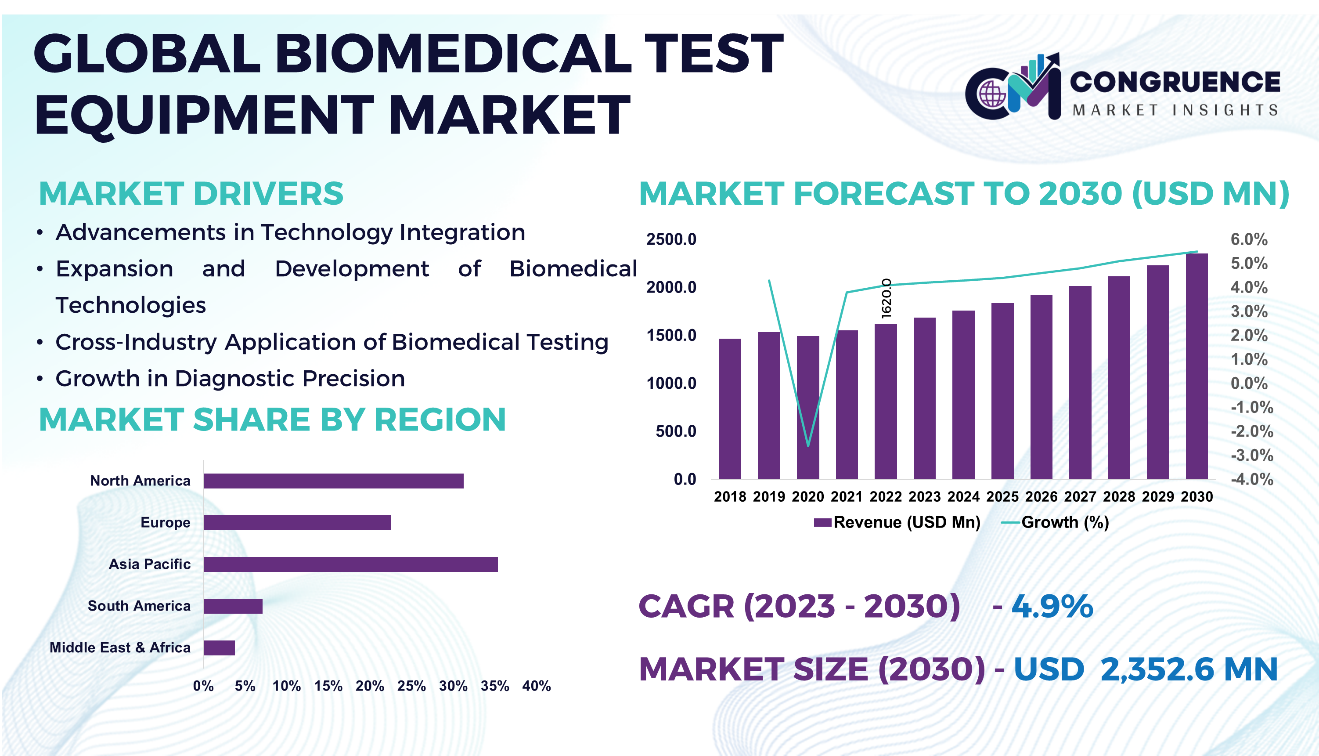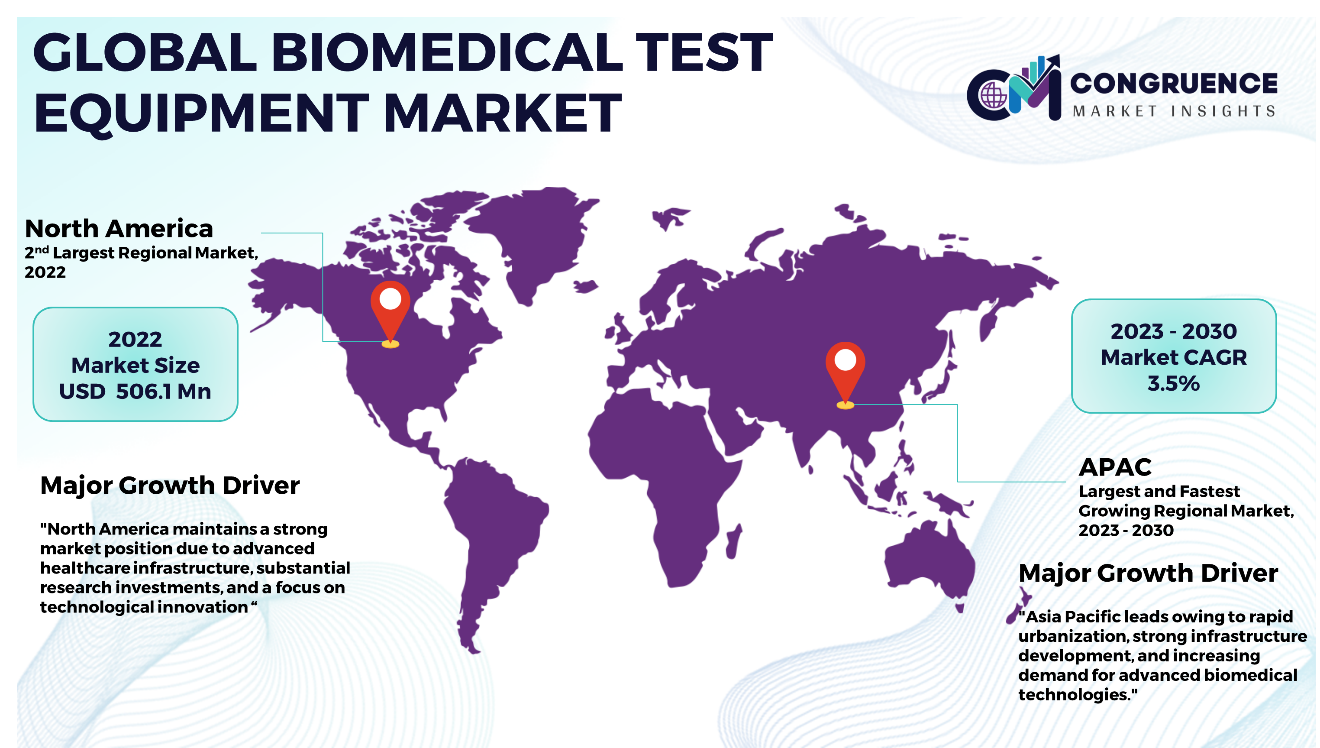Reports
The Global Biomedical Test Equipment Market was valued at USD 1,620.0 Million in 2022 and is anticipated to reach a value of USD 2,352.6 Million by 2030 expanding at a CAGR of 4.9% between 2023 and 2030.
Biomedical test equipment plays a pivotal role in modern healthcare through the integration of advanced technologies such as artificial intelligence and augmented reality/virtual reality, enhancing diagnostic precision and patient care. AI algorithms analyze extensive datasets from imaging and diagnostic equipment to facilitate disease detection and treatment planning. AR/VR technologies offer immersive training simulations for medical professionals and improve procedural accuracy during surgeries. Common testing methods encompass imaging, in-vitro diagnostics, and patient monitoring. Apart from healthcare, biomedical testing techniques find applications in diverse industries such as environmental monitoring (water quality analysis), food safety (pathogen detection), and pharmaceutical development (drug testing and efficacy studies). This cross-industry utilization underscores the versatility and significance of biomedical test equipment in ensuring safety, quality, and innovation across various sectors.

To learn more about this report, request a free sample
copy
Biomedical Test Equipment Market Major Driving Forces
Advancements in Technology Integration: Continuous progress in technologies like artificial intelligence (AI), machine learning, and Internet of Things (IoT) enhances the capabilities and precision of biomedical test equipment, fostering demand for advanced diagnostic solutions.
Expansion and Development of Biomedical Technologies: Growing biomedical research and development activities fuel innovation in diagnostic technologies, creating opportunities for market expansion and product diversification.
Cross-Industry Application of Biomedical Testing: The utilization of biomedical testing techniques across industries such as environmental monitoring, food safety, and pharmaceutical development contributes to market demand and diversification.
Growth in Diagnostic Precision: Increasing emphasis on diagnostic accuracy and precision fuels the adoption of advanced biomedical test equipment for enhanced disease detection and patient care.
Biomedical Test Equipment Market Key Opportunities
Technological Upgradations: There are ongoing advancements in technologies such as AI, machine learning, and IoT offer prospects to enhance the capabilities and precision of biomedical test equipment.
Expansion of Point-of-Care Testing: The shift towards decentralized healthcare and increased demand for rapid diagnostics create opportunities for portable and user-friendly test equipment.
Remote Monitoring Solutions: The demand for remote patient monitoring and telemedicine drives opportunities for innovative test equipment with connectivity functions.
Biomedical Test Equipment Market Key Trends
· AI, IoT, and machine learning drive precision and connectivity in biomedical equipment, enhancing diagnostics and patient care.
· Demand rises for portable, rapid diagnostics in decentralized healthcare settings for quick and efficient patient testing.
· Growing focus on tailored treatments drives demand for specialized diagnostic tools and patient-specific testing solutions.
· Increased adoption of remote patient monitoring technologies for telemedicine and continuous healthcare management.
· Stricter regulatory standards drive innovation in equipment design and quality assurance for patient safety and compliance.
Region-wise Market Insights
Asia Pacific accounted for the largest market share at 35.33% in 2022 and is expected to register the fastest growth, expanding at a CAGR of 3.5% between 2023 and 2030.

To learn more about this report, request a free sample
copy
Asia Pacific's dominance is propelled by rapid urbanization, robust infrastructure development, and strong demand for advanced healthcare solutions, leveraging cutting-edge technologies like AI and IoT. North America maintains a robust market share owing to its advanced healthcare infrastructure, substantial investments in research and development, and a focus on personalized medicine. Europe's significant position is supported by stringent regulatory standards, a strong emphasis on quality assurance, and a growing trend towards preventive healthcare. South America demonstrates promising growth potential driven by industry developments, increasing healthcare expenditure, and heightened awareness of diagnostic technologies. Meanwhile, the Middle East and Africa are experiencing steady growth, supported by improving healthcare infrastructure and investments in biomedical technologies.
Market Competition Landscape
The biomedical test equipment market is characterized by intense rivalry and strategic positioning among industry players. The factors that fuels competition include technological innovation, regulatory compliance, and customer-centric strategies. Companies differentiate themselves through product excellence, reliability, and service quality. Market companies focus on continuous improvement in equipment performance, diagnostic accuracy, and integration of advanced technologies like AI and IoT. Distribution networks and partnerships are crucial for market penetration and customer reach. Strict regulatory standards require high levels of quality assurance and safety compliance. Overall, innovation, quality, and customer satisfaction are paramount in shaping the success of biomedical test equipment providers in this dynamic market.
Key players in the global biomedical test equipment market implement various organic and inorganic strategies to strengthen and improve their market positioning. Prominent players in the market include:
· Siemens Healthcare Private Limited
· Thermo Fisher Scientific Inc.
· Abbott
· F. Hoffmann-La Roche Ltd.
· Koninklijke Philips N.V.
· General Electric Company
· Medtronic
· Fluke
· Johnson & Johnson Private Limited
· Agilent Technologies, Inc.
· Danaher
· Sysmex
· Bio-Rad Laboratories, Inc.
· EVIDENT
· Illumina, Inc.
· PerkinElmer Inc.
· Stryker
· Waters
· Hologic, Inc.
|
Report Attribute/Metric |
Details |
|
Market Revenue in 2022 |
USD 1,620.0 Million |
|
Market Revenue in 2030 |
USD 2,352.6 Million |
|
CAGR (2023 – 2030) |
4.9% |
|
Base Year |
2022 |
|
Forecast Period |
2023 – 2030 |
|
Historical Data |
2018 to 2022 |
|
Forecast Unit |
Value (US$ Mn) |
|
Key Report Deliverable |
Revenue Forecast, Growth Trends, Market Dynamics, Segmental Overview, Regional and Country-wise Analysis, Competition Landscape |
|
Segments Covered |
· By Product Type (Imaging Equipment, In-Vitro Diagnostic Equipment, Patient Monitoring Equipment, and Others) · By Technology (Internet of Things (IoT), Artificial Intelligence (AI) and Machine Learning, Sensor, AR/VR, and Others) · By Application (Diagnostic Testing, Research and Development, Quality Control and Assurance, Clinical Trials, and Others) · By End Use (Hospitals, Diagnostic Laboratories, Specialty Clinics, Contract Research Organizations (CROs), and Others) |
|
Geographies Covered |
North America: U.S., Canada and Mexico Europe: Germany, France, U.K., Italy, Spain, and Rest of Europe Asia Pacific: China, India, Japan, South Korea, Southeast Asia, and Rest of Asia Pacific South America: Brazil, Argentina, and Rest of Latin America Middle East & Africa: GCC Countries, South Africa, and Rest of Middle East & Africa |
|
Key Players Analyzed |
Siemens Healthcare Private Limited, Thermo Fisher Scientific Inc., Abbott, F. Hoffmann-La Roche Ltd., Koninklijke Philips N.V., General Electric Company, Medtronic, Fluke, Johnson & Johnson Private Limited, Agilent Technologies, Inc., Danaher, Sysmex, Bio-Rad Laboratories, Inc., EVIDENT, Illumina, Inc., PerkinElmer Inc., Stryker, Waters, Hologic, Inc. |
|
Customization & Pricing |
Available on Request (10% Customization is Free) |
